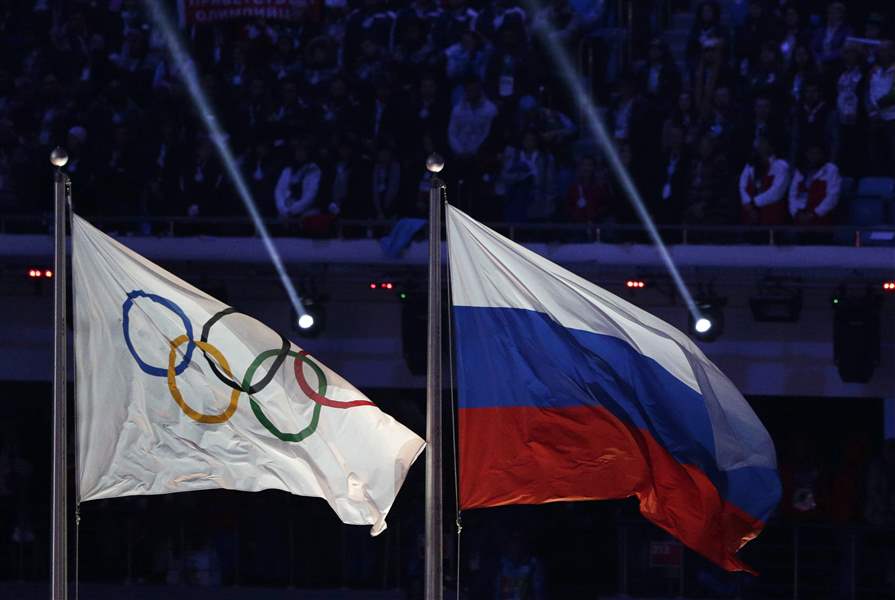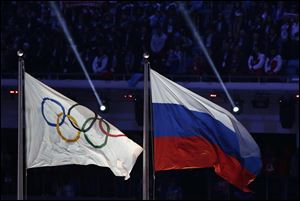
OP-ED
Russia wrongly attacks U.S. for its 2018 Olympic ban
12/24/2017

The Russian national flag, right, flies next to the Olympic flag during the closing ceremony of the 2014 Winter Olympics in Sochi, Russia. More than 200 Russian athletes are set to compete in Pyeongchang as an "Olympic Athlete from Russia" if they can prove they aren't tainted by the doping scandal that resulted in Russia's ban from the 2018 Winter Olympics.
ASSOCIATED PRESS
The already comatose U.S.-Russian relations have suffered even more from the recent Russian Olympic ban.
One can argue the pros and cons of the International Olympic Committee’s decision to disqualify Russia’s Olympic team from the 2018 Winter Games in South Korea, but what’s clear so far is that Russian President Vladimir Putin has turned the event to his political advantage — at the expense of Russia’s relations with the United States.

The Russian national flag, right, flies next to the Olympic flag during the closing ceremony of the 2014 Winter Olympics in Sochi, Russia. More than 200 Russian athletes are set to compete in Pyeongchang as an "Olympic Athlete from Russia" if they can prove they aren't tainted by the doping scandal that resulted in Russia's ban from the 2018 Winter Olympics.
It is clear to a disinterested observer that the IOC’s move was necessitated by Russia’s outrageous massive doping campaign at the last winter Olympics it hosted and the equally outrageous cover-up that ensued.
Earlier this month, however, Mr. Putin accused U.S. security agencies of controlling the main whistleblower on Russian doping in the 2014 Winter Olympics and manipulating his testimony, summarily and without evidence.
Mr. Putin personally championed the idea of holding the 2014 Winter Games in Sochi, Russia, and then personally oversaw the construction of Olympic facilities, which cost Russia twice as much as projected because of massive fraud and thievery.
When Russia amassed the most medals in the 2014 games, it was celebrated as a national victory that boosted Russia’s international prestige like nothing since Russia’s victory over Nazi Germany in World War II.
Mr. Putin’s popularity at home soared as a result.
There is no doubt that he views the IOC’s decision as a slap in the face. Some Kremlin watchers in Russia have already warned he would retaliate against the United States when and where it would hurt the most.
Kremlin sycophants in Russia’s rubber-stamping parliament and the Kremlin-controlled media duly fanned an anti-U.S. hysteria, cursing the ban as a politically motivated act, with some calling it racist and an act of war. By some accounts, Mr. Putin’s so-called troll factory in St. Petersburg, which he infamously used to flood the social media with fake postings during the 2016 U.S. presidential election, was used again to amplify the message.
The resulting anti-U.S. sentiment in Russia reached, if not topped, that of spring, 1999, when NATO bombed Serbia, a traditionally close Russian ally, to stop its genocide of the Albanian population.

Sigov
In reaction to the news of the bombing, then-Russian Prime Minister Yevgeny Primakov, who was aboard an aircraft carrying him to Washington for an official visit, symbolically turned around over the Atlantic and returned home.
This time around, Russia has so far responded with increased violations of the cease-fire in Ukraine and with stepping up intrusions into NATO-controlled airspace in Syria, which resulted in multiple near-collisions between U.S. and Russian combat aircraft. The Russian media, with the exception of a few independent outlets, blame everything on the United States, casting Mr. Putin — the champion of Russian multibillion-dollar militarization campaign — as the nation’s savior.
Mr. Putin can definitely use the perceived Russian national humiliation, especially ahead of his country’s presidential election on March 18.
It has only been six years since his hold on power appeared to slip when massive anti-Putin protests rocked Moscow in December, 2011, after reports of massive ballot-stuffing in Russia’s parliamentary elections surfaced as his party claimed victory.
Having declared his candidacy, he does not want a repetition of that once he predictably claims victory in March.
So now that the IOC ban has brought the vast majority of the Russians to rally behind their president against the United States, his propaganda machine is using the momentum to marginalize the liberal opposition by claiming it too was sponsored by the United States.
As a matter of fact, the United States had nothing to do with the ban.
Moreover, it would not be counterintuitive to suggest that the Trump Administration, led by the man who appears to be in awe of Mr. Putin, would have prevented the ban had it been in its power to do so.
Consider that top Trump Administration officials questioned sending U.S. athletes to South Korea just days after Russia was disqualified from the Pyeongchang games. The administration then backpedaled on the issue once criticized in the media.
The bottom line is the Kremlin only has itself to blame both for the ban and for the further worsening relations that followed.
Mike Sigov, a former Russian journalist in Moscow, is a U.S. citizen and a staff writer for The Blade. Contact him at sigov@theblade.com, 419-724-6089, or on Twitter @mikesigovblade.